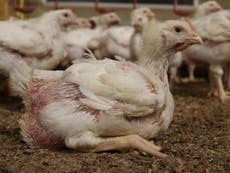I helped to expose animal cruelty in supermarket supply chains – the hard part is getting a retail giant to change
Consumers are in a rush to put food in mouths and save money, so they are misled into giving their tacit support to these practices

If there is one thing that vegans, vegetarians and meat eaters can agree on, it’s that animal suffering is unacceptable. And yet, it seems it is rampant within our food chain.
At the weekend my organisation Open Cages published footage which showed extreme suffering on two UK chicken farms which supply major retailers like Tesco, Sainsbury’s and Aldi. .
Intensively farmed chickens have been bred to grow incredibly fast. The animals in our footage were filmed literally collapsing under their own weight.
The scenes, from opposite sides of the country and different suppliers, were almost identical. Think about it: these animals were so burdened, weak and deformed that they literally could not walk.
Thousands nationwide were horrified that these chickens were allowed to suffer in this way. But the most interesting part might be that this barely surprises us anymore.
This wasn't the only exposé from chicken farms in the last few months, and retailers have come to rely on what seem to me to be vague, copy-and-paste responses, which we then accept as if they’re part of the game:
“We have strong procedures in place to ensure the welfare of the animals in our supply chain.”
“Any claims that our standards have not been met are always fully investigated.”
Frustrated consumers are provided with some soothing statements, and life goes on.
But what exactly are they investigating? And why claim “high standards” when the evidence is in front of them that this isn’t the case? Any business that buys huge amounts of chicken will be fully aware of the compromises needed and the risks that they bring.
Moy Park, the operator of the Lincoln farm, said “Where lameness occurs, these birds are removed from the flock.” But of course, many of us believe lameness should not be happening at all.
And the distressing thing for many people is just how routine this all is. This is simply part of daily life at these locations: the Lincoln farm has big red bins ready for worker to dump the corpses. Charts on the walls record the deaths.
Experts like Professor Veterinarian Andrew Knight assert that fast-growing chickens are predisposed to live painful lives, with studies showing how much health deteriorates with ultra fast growth.
For us non-scientists it’s common sense. If a human grew this fast a five year old would weigh more than 20 stone. If the chickens don’t die of heart failure, they may be culled by a farmer, or if they’re “lucky”: continue living in these dismal, overcrowded conditions.
No amount of “investigating” or better stockmanship will address these inherent issues properly: it’s like the retailers are happy putting a band-aid on an infected wound. They appear to be ignoring the causal problems.
Then there’s the issue of transparency. Have you ever noticed how these exposés are the only time most people witness what goes on in these factory farms? Could it be because it puts people off?
And it gets worse. Earlier this year research from the RSPCA said the most popular supermarkets actually encourage consumers to buy chickens that have suffered in industrial-style systems. Tesco, and other supermarket giants, certainly wouldn’t advertise the nature of these farms on their packaging or in-store images: they prefer cute names like “Willow Farms” (which is literally made up) and big pictures of free range chickens.
Consumers are in a rush to put food in mouths and save money, so they are misled into giving their tacit support to these practices.This is alarming: Tesco is effectively hiding the origin of much of its food.
There may be some sympathy for the retailers. What can supermarkets really do about chicken welfare, when there is such a high demand for chicken meat?
Well, they could commit to 100 per cent free range (or replace all chicken with quorn), but more realistically, the Better Chicken Commitment is a start. This is an initiative proposed by 30 animal protection organisations and designed to ensure that by 2026 a company sources entirely from higher welfare chickens who are given far more room.
In a nutshell: the BCC will and should be the very least a company could do to tackle chicken welfare. Names like KFC, Waitrose and M&S have signed up already. Although it would not solve animal suffering, it is a huge step. And it can run hand in hand with consumers reducing or cutting out animal product consumption.
But, so far Tesco has not joined the BCC, and with more than a quarter of UK market share it has an opportunity to set the standards for others, including it's nearest rivals Sainsbury's and Asda. After this latest exposé dies down, we as a society will move on, and supermarkets will be able to continue tolerating suffering in the name of profit. For once, we could choose not to let them get away with it.



Join our commenting forum
Join thought-provoking conversations, follow other Independent readers and see their replies